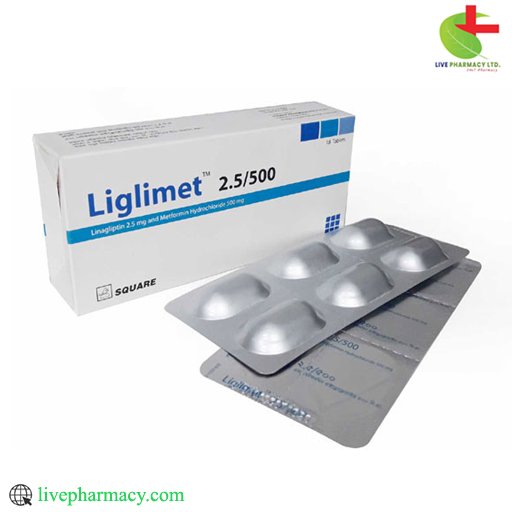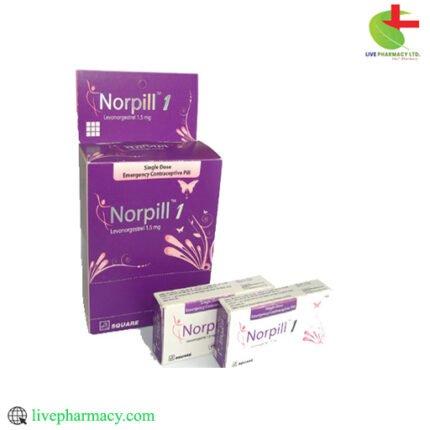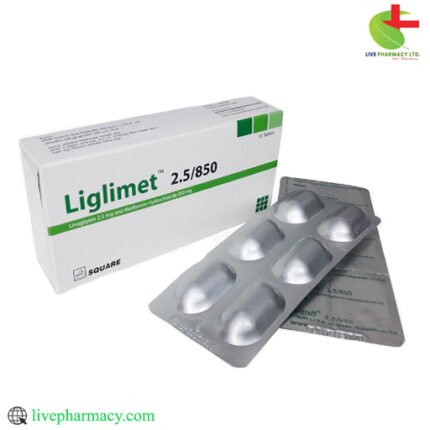Liglimet 500
72.00৳ Strip
- Unlock enhanced glycemic control with our specialized combination of Linagliptin and Metformin Hydrochloride.
- Tailored dosages to meet individual needs, ensuring effectiveness while minimizing side effects.
- Comprehensive guidance provided on dosage, interactions, and precautions.
- Empower yourself to take control of your health journey with confidence.
 Brand
Brand
|
Square Pharmaceuticals PLC |
|---|---|
 Generics
Generics
|
Linagliptin + Metformin Hydrochloride |
Indications
This combination serves as a supportive measure alongside diet and exercise for enhancing glycemic control in adult individuals diagnosed with type 2 diabetes mellitus. It’s recommended when treatment involving both Linagliptin and Metformin Hydrochloride is deemed suitable.
Pharmacology
Linagliptin plays a pivotal role in managing glycemic levels in patients with type 2 diabetes mellitus. Acting as an inhibitor of DPP-4 (dipeptidyl peptidase-4), Linagliptin prevents the breakdown of incretin hormones GLP-1 (glucagon-like peptide-1) and GIP (glucose-dependent insulinotropic polypeptide). By doing so, it elevates the levels of active incretin hormones, prompting insulin release from pancreatic beta (β) cells in response to glucose levels and reducing glucagon secretion from pancreatic alpha (α) cells.
Metformin Hydrochloride, a biguanide-type oral antihyperglycemic drug, is employed in managing type 2 diabetes. It effectively lowers both basal and postprandial plasma glucose levels through various mechanisms, including the reduction of hepatic glucose production, decreased absorption of glucose in the intestines, and improved insulin sensitivity, thereby enhancing peripheral glucose uptake and utilization.
Dosage & Administration
The dosage of Linagliptin & Metformin should be tailored to individual needs, considering both effectiveness and tolerability. The recommended maximum dose is 2.5 mg Linagliptin and 1000 mg Metformin Hydrochloride twice daily, to be taken with meals. Gradual dose escalation is advisable to mitigate gastrointestinal side effects associated with Metformin Hydrochloride usage.
For patients not currently on Metformin Hydrochloride treatment, initiation involves 2.5 mg Linagliptin and 500 mg Metformin Hydrochloride twice daily. Patients already on Metformin Hydrochloride should commence with 2.5 mg Linagliptin in addition to their current Metformin Hydrochloride dose, twice daily.
For the extended-release tablet formulation, individualization of dosage is crucial while ensuring not to exceed the recommended daily maximum of 5 mg Linagliptin and 2000 mg Metformin Hydrochloride. This combination should be administered once
daily with a meal.
Interaction
Certain drugs, particularly cationic drugs and carbonic anhydrase inhibitors, may interact with Metformin, potentially affecting its efficacy. It’s important to monitor patients closely and adjust doses accordingly when co-administering these medications. Additionally, inducers of P-glycoprotein and CYP3A4 enzymes may impact Linagliptin exposure, necessitating caution and consideration of alternative treatments.
Contraindications
This combination is contraindicated in patients with renal impairment, acute or chronic metabolic acidosis (such as diabetic ketoacidosis), and hypersensitivity to Linagliptin or Metformin Hydrochloride.
Side Effects
Common side effects include nasopharyngitis and diarrhea. Hypoglycemia may occur more frequently in patients using this combination alongside sulfonylureas.
Pregnancy & Lactation
Limited data are available regarding the safety of this combination during pregnancy and lactation. Its use should be considered only if clearly needed, with caution exercised during lactation.
Precautions & Warnings
Close monitoring is advised for lactic acidosis and pancreatitis symptoms. Temporary discontinuation may be necessary before certain procedures or in cases of severe illness. Additionally, precautions regarding alcohol consumption, other medications, counseling, travel, and emergency preparedness should be heeded.
Overdose Effects
In the event of an overdose, supportive measures should be taken, though removal of Linagliptin by dialysis is unlikely. Careful monitoring and supportive treatment are essential, especially in cases of Metformin Hydrochloride overdose, which may lead to hypoglycemia or lactic acidosis.
Therapeutic Class
This combination falls under the category of combination oral hypoglycemic preparations.
Storage Conditions
Store in a cool, dry place below 30°C, away from light and moisture, and out of reach of children.













Reviews
There are no reviews yet.